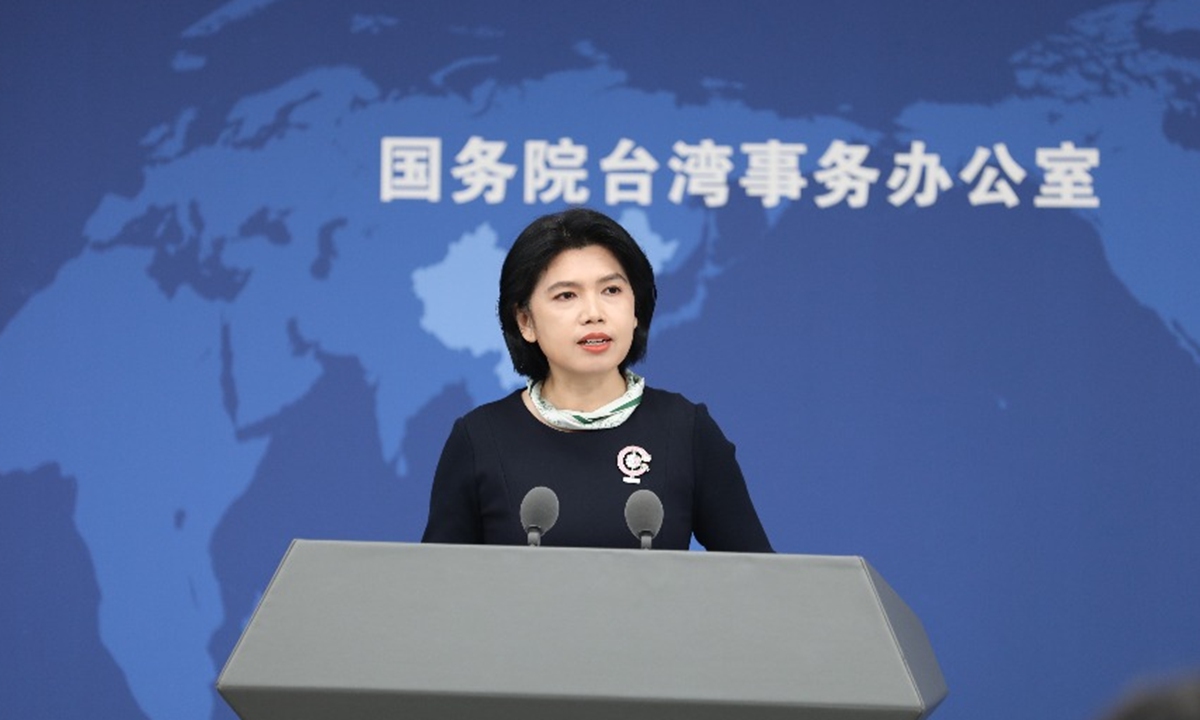
Zhu Fenglian Photo: Taiwan Affairs Office of the State Council
Asked to comment on US imposition of a 20 percent "reciprocal tariff" on the island of Taiwan, higher than the 15 percent rate on Japan and South Korea, and on remarks by Taiwan regional leader Lai Ching-te that the tariff rate could be negotiable with a possible pledge to increase investment in the US by $400 billion, Zhu Fenglian, a spokesperson for the State Council Taiwan Affairs Office, said on Wednesday that Taiwan residents and industries are deeply disappointed by the DPP authorities' response.
Zhu noted that instead of safeguarding the vital interests of the Taiwan people in the face of US bullying through tariff hikes and deliberate manipulation of the NT dollar's appreciation, the DPP authorities have intensified their kneeling and ingratiating themselves with the US and selling out Taiwan without limits, offering the US massive extortion funds without hesitation.
"$400 billion is equivalent to half of Taiwan's annual GDP. What will the people of Taiwan think?" she asked.
In the face of rising external risks and uncertainties, Taiwan could have strengthened economic cooperation and integration with the mainland to enhance industrial resilience, consolidate the foundation for economic growth and improve its ability to withstand risks. Instead, driven by the ill intention to achieve "Taiwan independence" by seeking foreign support, the DPP authorities have disregarded the island's economy and livelihoods, selling out Taiwan's development interests and causing deep harm to its people and businesses, said the spokesperson.
"We sternly warn the DPP authorities that currying favor will bring no benefits, and kneeling to the US will lead nowhere," Zhu said.
Discontent over the tariff rate is widespread in Taiwan. A poll conducted by a Taiwan foundation found only 5.8 percent of respondents were "very satisfied" with the outcome of the tariff talks, while 24.5 percent were "not satisfied at all," a Taiwan local media outlet reported Wednesday.
The US tariff measures have severely impacted Taiwan's auto market. Taiwan's finance department said Tuesday that in July, net vehicle commodity tax revenue fell by NT$3.9 billion ($130 million) year-on-year, dropped 45.6 percent, marking the steepest decline in two and a half years, said the report.
Officials attributed the drop mainly to uncertainty surrounding the US reciprocal tariffs, which also dampened new car registrations, according to the report. Authority also noted that the tariffs have hurt not only the auto sector, but also investment, consumption, and housing confidence, leading to further declines in related tax revenues.
An expert said the DPP authorities' failure in tariff talks stems from abandoning economic fundamentals, taking a "kneeling to the US" stance, and deliberately cutting off normal trade relations with the mainland.
From an economic perspective, the island of Taiwan had a major bargaining chip with the US - to strengthen economic cooperation with the mainland and signal that without the US market, there is still the Chinese mainland market. This could have made the US more cautious in negotiations. But the DPP authorities refuse to cooperate with the mainland, treating the relationship as a liability, so the disappointing outcome was expected, Zheng Jian, a professor at the Taiwan Research Institute of Xiamen University, told the Global Times on Wednesday.
"The US now wants to directly obtain funds and part of Taiwan's enterprises, such as TSMC's technology, to turn them into US' competitive advantages. The DPP authorities are granting every demand, selling out Taiwan completely," Zheng said.
He added that if reports of Taiwan investing $400 billion in the US are true, the move would drain the island's economy, hollow out its industries, and weaken its bargaining power in tariff and other issues.
Zhu also noted at the Wednesday press briefing that the DPP authorities care only about party interests, showing deference to the US in tariff talks while ignoring how domestic businesses can survive under heavy duties.
The DPP authorities expend no effort to counter tariff bullying but work actively to push for "decoupling" and disruption of cross-Straits economic cooperation, undermining Taiwan's business environment and narrowing its development space, Zhu said.
When asked about multiple recent polls showing Lai Ching-te's approval rating falling to the lowest since taking office, with disapproval and distrust rate both exceeding half, Zhu said Lai has intensified his promotion of "Taiwan independence" rhetoric, worsened social divisions on the island, suppressed cross-Straits exchanges and cooperation, stirred confrontation, sold out compatriots' interests and well-being, and undermined peace and stability in the Taiwan Straits.
"These actions, driven by political self-interest and disregard for livelihoods, run counter to public opinion and are unpopular. The people of Taiwan see this clearly," Zhu said.
